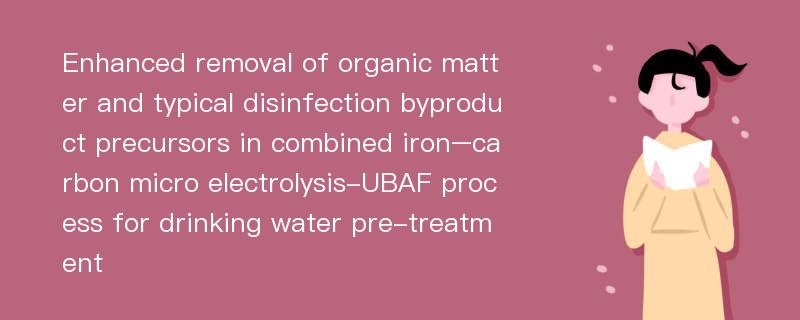
论文摘要
The organic matter and two types of disinfection byproduct(DBP) precursors in micropolluted source water were removed using an iron–carbon micro-electrolysis(ICME)combined with up-flow biological aerated filter(UBAF) process. Two pilot-scale experiments(ICME-UBAF and UBAF alone) were used to investigate the effect of the ICME system on the removal of organic matter and DBP precursors. The results showed that ICME pretreatment removed 15.6% of dissolved organic matter(DOM)and significantly improved the removal rate in the subsequent UBAF process. The ICME system removed 31% of trichloromethane(TCM) precursors and 20% of dichloroacetonitrile(DCAN) precursors. The results of measurements of the molecular weight distribution and hydrophilic fractions of DOM and DBP precursors showed that ICME pretreatment played a key role in breaking large-molecular-weight organic matter into low-molecular-weight components, and the hydrophobic fraction into hydrophilic compounds, which was favorable for subsequent biodegradation by UBAF.Three-dimensional fluorescence spectroscopy(3D-EEM) further indicated that the ICME system improved the removal of TCM and DCAN precursors. The biomass analysis indicated the presence of a larger and more diverse microbial community in the ICME-UBAF system than for the UBAF alone. The high-throughput sequencing results revealed that domination of the genera Sphingomonas, Brevundimonas and Sphingorhabdus contributed to the better removal of organic matter and two types of DBP precursors. Also, Nitrosomonas and Pseudomonas were beneficial for ammonia removal.
论文目录
文章来源
类型: 期刊论文
作者: Yinghan Chen,Tao Lin,Wei Chen
来源: Journal of Environmental Sciences 2019年04期
年度: 2019
分类: 工程科技Ⅰ辑,工程科技Ⅱ辑
专业: 建筑科学与工程
单位: Ministry of Education Key Laboratory of Integrated Regulation and Resource Development on Shallow Lakes,Hohai University,College of Environment,Hohai University
基金: supported by the National Natural Science Foundation of China (No. 51778208),the Major Science and Technology Program for Water Pollution Control and Treatment (No. 2017ZX07201002),the Qing Lan Project,and the Priority Academic Program Development of Jiangsu Higher Education Institutions
分类号: TU991.2
页码: 315-327
总页数: 13
文件大小: 5942K
下载量: 46
